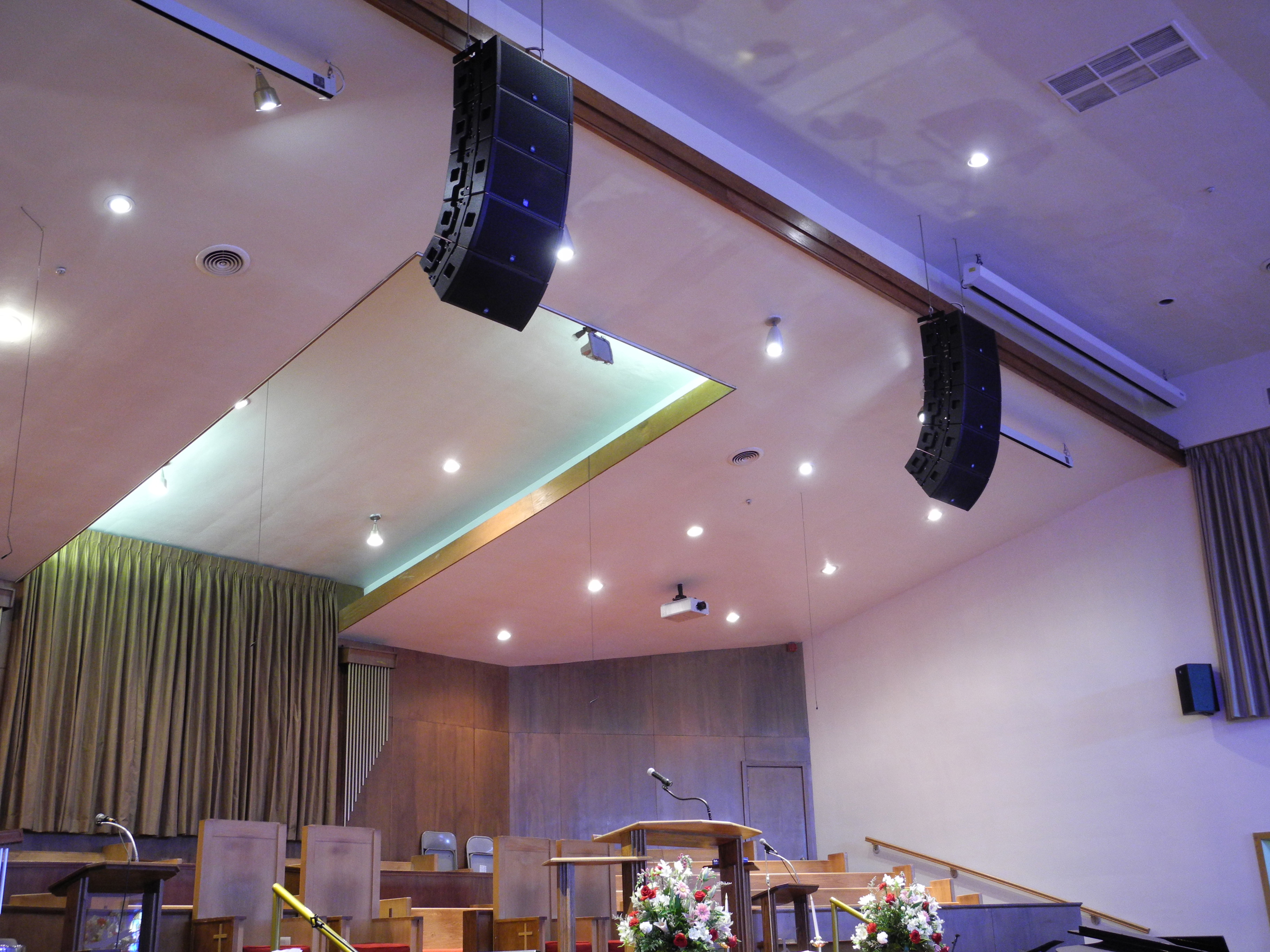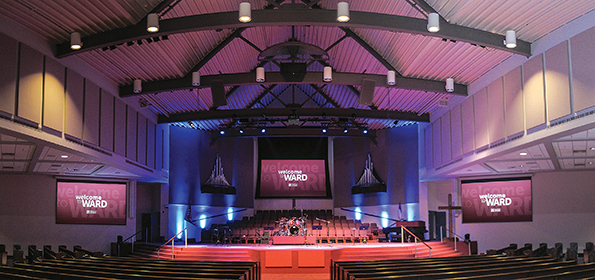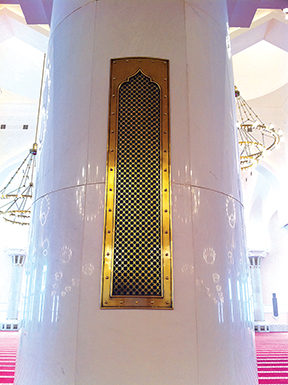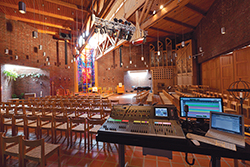
 It’s hard to overstate the importance of a good sound system to your church. Few things are more critical than getting the message across.
It’s hard to overstate the importance of a good sound system to your church. Few things are more critical than getting the message across.
A service that fails to communicate and inspire will not keep its congregation for long.
By Rik Kirby & Daniel Keller
What defines good sound?
While some might argue that the concept is subjective, there are certain aspects of a good sound system that we can all agree on. Spoken word should be intelligible. Musical performance should be clear and full-range. And sound should be consistent, everywhere in the house.
Of course, addressing these goals will vary widely from one church to another. Are you welcoming your flock in a 1,000-seat sanctuary? Clearly, your needs will differ from a congregation meeting in a 300-seat chapel, an auditorium, or a converted warehouse space.

Consider your space
Larger, traditional worship spaces — with their soaring walls and tiled floors — tend toward a natural reverberance that’s ideal for enhancing pipe organ and choir, but less so for speech intelligibility. Echoes from reflective surfaces can add up to a massive cacophony, particularly for those seated further away from the source.
Another effect of reverberant spaces is a loss of directionality. Every listener should be able to tell where the sound is coming from. The sound system must be positioned and time-aligned so that imaging is consistent — if the piano is on the right and the guitarist is on the left, listeners should be able to distinguish this, even with their eyes closed.
Consistent coverage is equally important, and equally challenging, in many worship spaces. Ideally, every seat will receive the same level of sound and the same tonal balance. Architectural considerations can make this difficult to achieve, with peaked ceilings, windows, balconies and other reflective surfaces creating hot spots and dead zones throughout the venue.
 Consider your style
Consider your style
Another defining factor in choosing a sound system is your style of worship. A traditional liturgy, with the sermon supported by choir and organ, will have markedly different sonic needs than a contemporary service sporting amplified instruments and multiple singers. Even within the realm of contemporary worship, system needs will differ for a service featuring a light semi-acoustic duo versus a nine-piece amplified praise band.
While it’s obvious that a system designed for music will require greater performance than a system for speech, the differences are not as great as one might think. Despite the classic connotation of “speech systems” as low-budget paging horns, producing human speech with good intelligibility and minimal distortion requires a system capable of excellent, full-range fidelity. The only major difference is that the music system requires greater low-frequency response and greater volume levels.
Volume requirements are another consideration. A good sound system will be capable of getting loud enough to project the presentation — whether it’s a sermon or a praise band — to the back rows without distorting.
The perfect system
While it’s easy to get caught up in marketing hype and sound system envy, it’s important to realize there’s no one-size-fits-all loudspeaker. The right system for one room will be entirely wrong for another, so don’t make the mistake of choosing a system based on what you’ve heard in other venues.
As stated earlier, your acoustical environment will largely dictate your sound system priorities. A large, acoustically designed theatrical-style venue might be an ideal candidate for a concert-style line array. That same system might be largely ineffective in a smaller sanctuary, where a point-source system might be a better choice.
Many larger, more traditional spaces have benefitted from a relatively new technology: the digitally steered array. These digitally steered systems are capable of tightly focusing their output, directing the sound toward the listeners, while keeping it away from walls, ceilings and other reflective surfaces.
![]() Aesthetics is another important consideration. Particularly in more traditional settings, both congregation and clergy will object to a large cluster or array of loudspeaker boxes hanging from the ceiling. Many of the newer steered array systems offer a slim profile that will more easily blend with your sanctuary’s architecture. Often, these boxes can be painted to match the décor, or even concealed behind grilles, rendering them nearly imperceptible to the casual congregant.
Aesthetics is another important consideration. Particularly in more traditional settings, both congregation and clergy will object to a large cluster or array of loudspeaker boxes hanging from the ceiling. Many of the newer steered array systems offer a slim profile that will more easily blend with your sanctuary’s architecture. Often, these boxes can be painted to match the décor, or even concealed behind grilles, rendering them nearly imperceptible to the casual congregant.
Go with a pro
It’s often been said that a church will purchase two or even three sound systems before finding the right one for its space. While this is frequently the case, these days it’s a scenario that can easily be avoided.
The science of loudspeaker design has evolved to the point where we can accurately predict the performance of a system before hanging a single speaker. That’s why even the smallest sanctuary will benefit from working with a professional systems designer. With today’s acoustic modeling software, a competent system designer can not only identify the best loudspeaker choices, but where to place them for optimal performance.
Being able to predict the performance of different loudspeakers before installing them in the room goes a long way toward streamlining the decision-making process. The money invested in hiring a good systems designer can more than offset the expense of installing the wrong system, and can even make the difference between installing a good system and installing a great one.
 Rik Kirby is Vice President, Sales & Marketing at Renkus-Heinz, Inc. Located in Southern California for over 35 years, Renkus-Heinz is a manufacturer of high-end professional loudspeaker systems. Daniel Keller is CEO of Get It In Writing, Inc.®
Rik Kirby is Vice President, Sales & Marketing at Renkus-Heinz, Inc. Located in Southern California for over 35 years, Renkus-Heinz is a manufacturer of high-end professional loudspeaker systems. Daniel Keller is CEO of Get It In Writing, Inc.®
READ “PASTOR-FRIENDLY SOUND SYSTEMS” IN EACH ISSUE!
Future installments in this innovative new series will cover:
• System components
• Loudspeaker system types
• The process of specifying a system
• Do you need a consultant?
• Maintaining your investment


